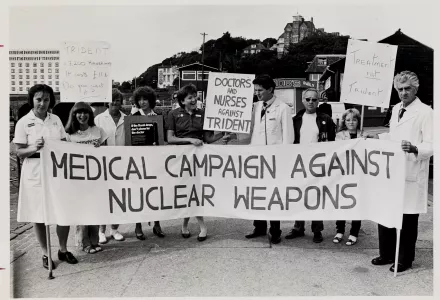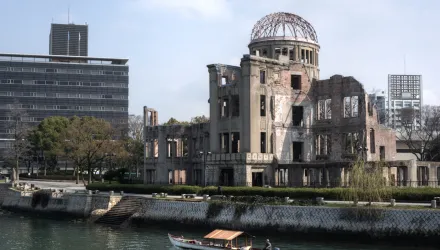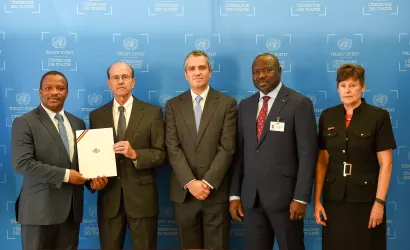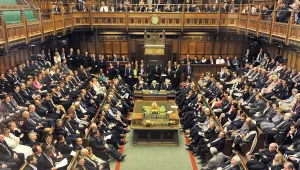Rebecca Davis Gibbons, University of Southern Maine
Dr. Rebecca Davis Gibbons is an assistant professor at the University of Southern Maine and formerly a postdoctoral research fellow with the Belfer Center's Project on Managing the Atom and International Security Program. She previously served as a visiting assistant professor of government at Bowdoin College, teaching courses on nuclear issues, international relations, and international order. Gibbons earned her Ph.D. in international relations from Georgetown University. Her dissertation examined how the United States persuaded other states to join the nuclear nonproliferation regime. Her research continues to focus on nonproliferation as well as on the movement to prohibit nuclear weapons. In 2013–2014, Gibbons was a predoctoral Stanton Nuclear Security Fellow at the RAND Corporation. She holds an M.A. in international security studies from Georgetown University and a BA in psychological & brain sciences from Dartmouth College. After college, she taught elementary school within the Bikini community on Kili Island in the Republic of the Marshall Islands.
Kjølv Egeland, Sciences Po
Dr. Kjølv Egeland is Marie Skłodowska-Curie Postdoctoral Fellow in Security Studies at Sciences Po, focusing on strategic narratives and global nuclear order. He completed his DPhil at the University of Oxford in 2018. In his thesis, Kjølv investigated the evolution of the institutional architecture for multilateral nuclear disarmament from 1968 to 2017. Kjølv’s scholarly interests lie in nuclear discourse and politics, the philosophy of international law, and ideology critique. Writing on topics spanning from treaty-making processes to emerging military technology, his work has appeared in journals such Global Change, Peace & Security, Critical Studies on Security, Survival, and Global Governance.
Hassan Elbahtimy, King’s College London
Dr. Hassan Elbahtimy is Senior Lecturer in the Department of War studies and director of the Centre for Science and Security Studies (CSSS). Hassan’s research focuses on international security and particularly two areas: the global politics of nuclear, chemical and biological weapons; and the history and modern politics of the Middle East. He has written widely on these topics including in Foreign Affairs, Journal of Strategic Studies, Security Studies and the Nonproliferation Review among others. In 2019, his research was awarded the McElveny Grand Prize by the Nonproliferation Review. A list of his academic publications can be found here.
From 2014 to 2016, Hassan ran an innovative research and training project on the role of human factors in nuclear verification in partnership with the Norwegian Institute of Energy Technology and the UK Atomic Weapons Establishment. This included running eight verification simulations in Norway involving British, German, Egyptian, South African, American and Russian participants. He is currently a member of the International Partnership for Nuclear Disarmament Verification (IPNDV). Since 2015, he has co-edited, with Professor John Simpson, the Non-Proliferation Treaty (NPT) Briefing Book that is updated regularly and serves as a reference guide to diplomats, civil society and academics working on the nuclear non-proliferation and disarmament regime.
Matthew Fuhrmann, Texas A&M University [moderator]
Dr. Matthew Fuhrmann is Professor of Political Science and Presidential Impact Fellow at Texas A&M University. His previous positions include Visiting Associate Professor at Stanford University's Center for International Security and Cooperation (2016-17), Stanton Nuclear Security Fellow at the Council on Foreign Relations (2010-11), and Pre-Doctoral Research Fellow at Harvard University's Belfer Center for Science and International Affairs (2007-08). He was named an Andrew Carnegie Fellow in 2016 by the Carnegie Corporation of New York. His research focuses on international relations, nuclear proliferation, and armed conflict. He is the author of Atomic Assistance: How “Atoms for Peace” Programs Cause Nuclear Insecurity (Cornell University Press, 2012) and the coauthor of Nuclear Weapons and Coercive Diplomacy (Cambridge University Press, 2017).
Stephen Herzog, ETH Zurich/Harvard Kennedy School
Dr. Stephen Herzog is a Senior Researcher in Nuclear Arms Control at the Center for Security Studies (CSS) at ETH Zurich. He is also an Associate of the Harvard Kennedy School's Project on Managing the Atom. Stephen is drafting a book manuscript about multilateral nuclear arms control and has several other ongoing projects on nuclear deterrence and proliferation. His research draws on archival studies, elite interviewing, and survey experiments.
Stephen holds a Ph.D. in Political Science from Yale University. His academic research is published in the Journal of Politics, Journal of Conflict Resolution, International Security, Contemporary Security Policy, Energy Research & Social Science, the Nonproliferation Review, and the Journal for Peace and Nuclear Disarmament. Previously, he worked for the U.S. Department of Energy’s National Nuclear Security Administration and the Federation of American Scientists.
Tamara Patton, Massachusetts Institute of Technology
Dr. Tamara Patton completed her PhD in Science, Technology and Environmental Policy at Princeton University’s School of Public and International Affairs in September 2021. Tamara is currently a Stanton Nuclear Security Fellow at MIT's Security Studies Program. Prior to coming to Princeton, she worked as a researcher at the Vienna Center for Disarmament and Non-Proliferation on emerging technologies for nuclear verification, including in the areas of satellite imagery analysis and virtual reality. She has also been a researcher at the Stockholm International Peace Research Institute, focusing on nuclear, conventional and humanitarian arms control issues. Her other appointments have included the US Naval Postgraduate School’s Common Operational Research Environment (CORE) Laboratory and Remote Sensing Center. She also has an MA in nonproliferation studies from the Middlebury Institute of International Studies and a BA in international studies from the University of Washington.
Olamide Samuel, University of Leicester
Dr. Olamide Samuel is a Research Associate in Nuclear Politics at the University of Leicester's School of History, Politics, and International Relations. He engages in track II diplomacy and researches arms control, nuclear policy, and international security. He has previously taught International Security and Diplomatic Practice at SOAS University of London from 2018 to 2021. From February 2019 to March 2021, he was the coordinator of SCRAP Weapons disarmament project.




